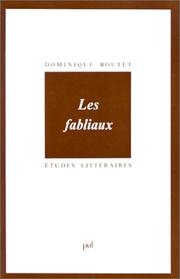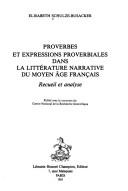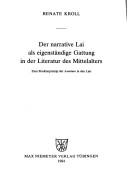| Listing 1 - 10 of 12 | << page >> |
Sort by
|
Book
ISBN: 1501746685 1501746669 Year: 2019 Publisher: Cornell University Press
Abstract | Keywords | Export | Availability | Bookmark
 Loading...
Loading...Choose an application
- Reference Manager
- EndNote
- RefWorks (Direct export to RefWorks)
Sylvia Huot points out the theatrical, performative quality of thirteenth- and fourteenth-century French illuminated manuscripts.
Narrative poetry, French. --- French narrative poetry --- French poetry --- Poetry
Book
ISBN: 0813053080 0813052777 9780813052779 9780813062419 0813062411 Year: 2017 Publisher: Gainesville, Florida : University Press of Florida,
Abstract | Keywords | Export | Availability | Bookmark
 Loading...
Loading...Choose an application
- Reference Manager
- EndNote
- RefWorks (Direct export to RefWorks)
Machaut's Legacy offers the first comprehensive discussion of the artistic legacy of Guillaume de Machaut, the most important poet and musician of the later Middle Ages, with the book offering twelve chapters detailing his influence on and connection to writers from Geoffrey Chaucer to Philip Roth.
Narrative poetry, French --- Middle Ages --- French narrative poetry --- French poetry --- History and criticism. --- Guillaume, de Machaut, --- Criticism and interpretation.

ISBN: 2130388760 9782130388760 Year: 1985 Volume: 5 Publisher: Paris: PUF,
Abstract | Keywords | Export | Availability | Bookmark
 Loading...
Loading...Choose an application
- Reference Manager
- EndNote
- RefWorks (Direct export to RefWorks)
Poetry --- Old French literature --- Fabliaux --- Tales --- French poetry --- Tales, Medieval --- Humorous poetry, French --- Narrative poetry, French --- History and criticism --- -Tales --- -French poetry --- -Tales, Medieval --- -Humorous poetry, French --- -Narrative poetry, French --- -French narrative poetry --- French humorous poetry --- French wit and humor --- Medieval tales --- French literature --- Folk tales --- Folktales --- Folk literature --- -History and criticism --- French narrative poetry --- Poésie française --- Histoire et critique --- Poésie française --- Histoire et critique. --- Fabliaux - History and criticism --- Tales - France - History and criticism --- French poetry - To 1500 - History and criticism --- Tales, Medieval - History and criticism --- Humorous poetry, French - History and criticism --- Narrative poetry, French - History and criticism
Book
ISBN: 081316236X 9780813162362 1322601852 9781322601854 0813151619 9780813151618 0813185912 Year: 1974 Publisher: Lexington, Kentucky : The University Press of Kentucky,
Abstract | Keywords | Export | Availability | Bookmark
 Loading...
Loading...Choose an application
- Reference Manager
- EndNote
- RefWorks (Direct export to RefWorks)
This collection is the first full-length literary study on Machaut, France's leading poet and musician of the 14th century. Machaut's narrative poems, called dits, have only been lightly studied. Here, author William Calin examines the works for their intrinsic merit and for their historical importance in influencing many writers, most notably Chaucer.
Narration (Rhetoric) --- Narrative poetry, French --- French narrative poetry --- French poetry --- History --- History and criticism. --- Guillaume, --- De Machault, Guillaume, --- De Machaut, Guillaume, --- Guillaume de Machaut, --- Guillelmus, --- Machau, Guillaume de, --- Machauld, G. de, --- Machault, Guillaume de, --- Machaut, G. de --- Machaut, Guillaume de, --- Mauchaut, Guillaume de, --- Criticism and interpretation. --- de Machaut, Guillaume --- Guillaume de Machaut --- Guillaume de Machault --- de Machault, Guillaume --- de Machau, Guillaume --- de Machaudio, Guillaume --- de Machaudo, Guillaume --- de Mascaudio, Guillaume --- de Machaudio, Guillelmus --- de Machaut, Guillaume, --- Rhetoric --- Discourse analysis, Narrative --- Narratees (Rhetoric)
Book
ISBN: 0801419220 1501746677 Year: 1987 Publisher: Ithaca (N.Y.) : Cornell university press,
Abstract | Keywords | Export | Availability | Bookmark
 Loading...
Loading...Choose an application
- Reference Manager
- EndNote
- RefWorks (Direct export to RefWorks)
As the visual representation of an essentially oral text, Sylvia Huot points out, the medieval illuminated manuscript has a theatrical, performative quality. She perceives the tension between implied oral performance and real visual artifact as a fundamental aspect of thirteenth- and fourteenth-century poetics. In this generously illustrated volume, Huot examines manuscript texts both from the performance-oriented lyric tradition of chanson courtoise, or courtly love lyric, and from the self-consciously literary tradition of Old French narrative poetry. She demonstrates that the evolution of the lyrical romance and dit, narrative poems which incorporate thematic and rhetorical elements of the lyric, was responsible for a progressive redefinition of lyric poetry as a written medium and the emergence of an explicitly written literary tradition uniting lyric and narrative poetics.Huot first investigates the nature of the vernacular book in the thirteenth and fourteenth centuries, analyzing organization, page layout, rubrication, and illumination in a series of manuscripts. She then describes the relationship between poetics and manuscript format in specific texts, including works by widely read medieval authors such as Guillaume de Lorris, Jean de Meun, and Guillaume de Machaut, as well as by lesser-known writers including Nicole de Margival and Watriquet de Couvin. Huot focuses on the writers' characteristic modifications of lyric poetics; their use of writing and performance as theme; their treatment of the poet as singer or writer; and of the lady as implied reader or listener; and the ways in which these features of the text were elaborated by scribes and illuminators. Her readings reveal how medieval poets and book-makers conceived their common project, and how they distinguished their respective roles.
Poetry --- Old French literature --- 840 "12/13" --- Books --- -French poetry --- -Manuscripts, French --- -Manuscripts, Medieval --- -Narrative poetry, French --- -Poetry --- -Scriptoria --- -Songs, French --- -French songs --- Copying rooms --- Writing rooms --- Rooms --- Illumination of books and manuscripts --- Manuscripts --- Monasteries --- Monastic libraries --- Poems --- Verses (Poetry) --- Literature --- French narrative poetry --- French poetry --- Medieval manuscripts --- French manuscripts --- French literature --- Library materials --- Publications --- Bibliography --- Cataloging --- International Standard Book Numbers --- Franse literatuur--?"12/13" --- History --- -History and criticism --- History and criticism --- Editing --- Reproduction --- Philosophy --- Manuscripts, French --- Manuscripts, Medieval --- Narrative poetry, French --- Scriptoria --- Songs, French --- History and criticism. --- Manuscripts. --- History. --- Editing. --- -Franse literatuur--?"12/13" --- 840 "12/13" Franse literatuur--?"12/13"
Book
ISBN: 0292708084 9780292708082 0292769563 Year: 1994 Publisher: Austin (Tex.) : University of Texas press,
Abstract | Keywords | Export | Availability | Bookmark
 Loading...
Loading...Choose an application
- Reference Manager
- EndNote
- RefWorks (Direct export to RefWorks)
The twelfth century witnessed the sudden appearance and virtual disappearance of an important literary genre—the Old French verse chronicle. These poetic histories of the British kings, which today are treated as fiction, were written contemporaneously with Latin prose narratives, which are regarded as historical accounts. In this pathfinding study, however, Jean Blacker asserts that twelfth-century authors and readers viewed both genres as factual history. Blacker examines four Old French verse chronicles—Gaimar's Estoire des Engleis (c. 1135), Wace's Roman de Brut (c. 1155) and Roman de Rou (c. 1160–1174), and Benoît de Sainte-Maure's Chronique des Ducs de Normandie (c. 1174–1180) and four Latin narratives—William of Malmesbury's Gesta Regum (c. 1118–1143) and Historia Novella (c. 1140–1143), Orderic Vitalis's Historia Ecclesiastica (c. 1118–1140), and Geoffrey of Monmouth's Historia Regum Britanniae (c. 1138). She compares their similarity in three areas—the authors' stated intentions, their methods of characterization and narrative development, and the possible influences of patronage and audience expectation on the presentation of characters and events. This exploration reveals remarkable similarity among the texts, including their idealization of historical and even legendary figures, such as King Arthur. It opens fruitful lines of inquiry into the role these writers played in the creation of the Anglo-Norman regnum and suggests that the Old French verse chronicles filled political, psychic, and aesthetic needs unaddressed by Latin historical writing of the period.
Rhetoric, Medieval --- Normans --- French poetry --- Latin prose literature, Medieval and modern --- Narrative poetry, French --- Narration (Rhetoric) --- Historiography --- History and criticism --- Great Britain --- History --- -Latin prose literature, Medieval and modern --- -Normans --- -Rhetoric, Medieval --- French literature --- Northmen --- Rhetoric, Medieval. --- History and criticism. --- Historiography. --- Narration (Rhetoric). --- French narrative poetry --- Narrative (Rhetoric) --- Narrative writing --- Rhetoric --- Discourse analysis, Narrative --- Narratees (Rhetoric) --- Normans - Historiography - Great Britain --- French poetry - History and criticism - To 1500 --- Latin prose literature, Medieval and modern - History and criticism --- Narrative poetry, French - History and criticism --- Great Britain - History - Norman period, 1066-1154

ISBN: 2852030047 9782852030046 Year: 1985 Volume: 9 Publisher: Paris : Champion,
Abstract | Keywords | Export | Availability | Bookmark
 Loading...
Loading...Choose an application
- Reference Manager
- EndNote
- RefWorks (Direct export to RefWorks)
French literature --- -Civilization, Medieval, in literature --- Narrative poetry, French --- -Proverbs in literature --- Proverbs, French --- French proverbs --- French poetry --- French narrative poetry --- History and criticism --- Old French literature --- Civilization, Medieval, in literature --- Proverbs in literature --- Civilization, Medieval, in literature. --- Proverbs in literature. --- Proverbs, French. --- History and criticism. --- Littérature française --- Poésie narrative française --- Proverbes dans la littérature --- Proverbes français --- Histoire et critique --- Franse roman [Middeleeuwen]. 12e-13e eeuw. --- Proverbes français. 12e-13e s. --- Roman [Moyen-âge] français. 12e-13e s. --- Spreekwoorden (Franse). 12e-13e eeuw. --- French literature - To 1500 - History and criticism --- Narrative poetry, French - History and criticism
Book
ISBN: 1782042423 1843843722 Year: 2014 Publisher: Woodbridge, Suffolk, England ; Rochester, New York : D.S. Brewer,
Abstract | Keywords | Export | Availability | Bookmark
 Loading...
Loading...Choose an application
- Reference Manager
- EndNote
- RefWorks (Direct export to RefWorks)
A close examination of an important theme in Machaut's works. A milestone in Machaut studies and in late-medieval French literature in general. Machaut, already considered the seminal figure in late-medieval poetics and music, here comes across in these respects more clearly than ever. Kelly also further contextualises him within what we might call the authorial `apprenticeship tradition' of Boethius, the Roman de la Rose, Dante, and later Gower, Chaucer, and Christine de Pizan. The fruit of one of the field's most distinguished scholars today. Nadia Margolis, Mount Holyoke College. Guillaume de Machaut was celebrated in the later Middle Ages as a supreme poet and composer, and accordingly, his poetry was recommended as amodel for aspiring poets. In his Voir Dit, Toute Belle, a young, aspiring poet, convinces the Machaut figure to mentor her. This volume examines Toute Belle as she masters Machaut's dual arts of poetry and love, focusing onher successful apprenticeship in these arts; it also provides a thorough review of Machaut's art of love and art of poetry in his dits and lyricsm, and the previous scholarship on these topics. It goes on to treat Machaut's legacy among poets who, like Toute Belle, adapted his poetic craft in new and original ways. A concluding analysis of melodie identifies the synaesthetic pleasure that late medieval poets, including Machaut, offer their readers. Douglas Kelly is Professor Emeritus at the University of Wisconsin, Madison.
Narrative poetry, French --- Poetry --- History and criticism. --- Psychological aspects. --- Guillaume, --- Criticism and interpretation. --- French narrative poetry --- French poetry --- de Machaut, Guillaume --- Guillaume de Machaut --- Guillaume de Machault --- de Machault, Guillaume --- de Machau, Guillaume --- de Machaudio, Guillaume --- de Machaudo, Guillaume --- de Mascaudio, Guillaume --- de Machaudio, Guillelmus --- de Machaut, Guillaume, --- Guillaume de Machaut, --- Guillelmus, --- Machau, Guillaume de, --- Machauld, G. de, --- Machault, Guillaume de, --- Machaut, G. de --- Machaut, Guillaume de, --- Mauchaut, Guillaume de, --- Douglas Kelly. --- Fiction. --- Guillaume de Machaut. --- Machaut. --- Medieval Apprenticeship Tradition. --- Poetic Craft. --- Toute Belle. --- Truth. --- University of Wisconsin, Madison. --- Voir Dit. --- art of love. --- art of poetry. --- late-medieval poetics. --- music. --- synaesthetic pleasure.
Book
ISBN: 1400871522 0691062420 9781400871520 Year: 1973 Publisher: Princeton, N.J. : Princeton University Press,
Abstract | Keywords | Export | Availability | Bookmark
 Loading...
Loading...Choose an application
- Reference Manager
- EndNote
- RefWorks (Direct export to RefWorks)
Twelfth-century France has been described as the key to many of the most important developments of medieval civilization. Nowhere is this description more accurate than in the domain of poetic invention. The years 1050 to 1200 witnessed the development of a brilliant body of vernacular narrative that not only expressed the complexity of its own time but also bequeathed to posterity a wide gamut of creative possibilities.Although much has been written about the works of this period, Karl Uitti offers the first critically orientated overview of this poetry as poetry. In the sections devoted to the Songs of Alexis and Roland he studies the narrative as it serves, in various ways, truths exterior to its own organization. These include the implications of Alexis' imitation of Christ and the way the Song of Roland is history conceived in literary and poetic terms. Although a number of devices are examined, the poems are seen in terms of their total significance.The second part of the book, dedicate principally to the œuvre of Chrétien de Troyes, discusses a new kind of poetry, poetry whose truth depends on the reader's submitting entirely to the internal coherence of each work-in a very meaningful sense the poem itself is the thing. What it says is specifically a matter of how it says it. No higher claim for the dignity of poetic activity has ever been made.Originally published in 1973.The Princeton Legacy Library uses the latest print-on-demand technology to again make available previously out-of-print books from the distinguished backlist of Princeton University Press. These editions preserve the original texts of these important books while presenting them in durable paperback and hardcover editions. The goal of the Princeton Legacy Library is to vastly increase access to the rich scholarly heritage found in the thousands of books published by Princeton University Press since its founding in 1905.
Alexius, Saint -- Legends. --- Chanson de Roland. --- Chrétien, de Troyes, 12th cent. --- French poetry --- Rhetoric, Medieval --- Narrative poetry, French --- Roland (Legendary character) --- Christian saints --- Christian hagiography --- Arthurian romances --- Knights and knighthood in literature --- Christian saints in literature --- Myth in literature --- French Literature --- Romance Literatures --- Languages & Literatures --- History and criticism --- Romances --- History of doctrines --- Cult --- History --- Orlando (Legendary character) --- Roland --- French narrative poetry --- -Narrative poetry, French --- -Arthurian romances --- -Christian saints in literature --- -Orlando (Legendary character) --- Chrétien de Troyes --- Christian saints in literature. --- Myth in literature. --- Rhetoric, Medieval. --- Vie de saint Alexis. --- Chrestien de Troyes --- Christian von Troyes --- -French narrative poetry --- -Christian saints --- -History of doctrines --- -Congresses --- -History and criticism --- Criticism and interpretation. --- Knights and knighthood in literature. --- History and criticism. --- Chretien, --- Chrestien de Troyes, --- Chrestien, --- Chrétien, --- Kretʹen, --- Kretjen, --- Kristian, --- Troyes, Chrétien de, --- Кретјен, --- Roland (Poem) --- Rolandslied --- Song of Roland --- Roland-ének --- Chanson de Roland ou de Roncevaux --- Poetry --- Old French literature --- anno 1100-1199 --- anno 1000-1099 --- Legends --- Romances&delete& --- Chrétien, --- Orlando

ISBN: 3484522011 9783484522015 3111630110 Year: 1984 Volume: 201 Publisher: Tübingen: Niemeyer,
Abstract | Keywords | Export | Availability | Bookmark
 Loading...
Loading...Choose an application
- Reference Manager
- EndNote
- RefWorks (Direct export to RefWorks)
Poetry --- Fiction --- Old French literature --- Marie de France --- Lays --- Narrative poetry, French --- French poetry --- Adventure and adventurers in literature. --- Knights and knighthood in literature. --- Narration (Rhetoric) --- Rhetoric, Medieval. --- Poésie narrative française --- Poésie française --- Aventures et aventuriers dans la littérature --- Chevaliers et chevalerie dans la littérature --- Narration --- Rhétorique médiévale --- History and criticism. --- History --- Histoire et critique --- Histoire --- Adventure and adventurers in literature --- Knights and knighthood in literature --- Rhetoric, Medieval --- History and criticism --- -Knights and knighthood in literature --- -Narrative poetry, French --- -Narration (Rhetoric) --- Narrative (Rhetoric) --- Narrative writing --- Rhetoric --- Discourse analysis, Narrative --- Narratees (Rhetoric) --- French narrative poetry --- Folk songs --- Tales --- French literature --- Poésie narrative française --- Poésie française --- Aventures et aventuriers dans la littérature --- Chevaliers et chevalerie dans la littérature --- Rhétorique médiévale --- Lais français. --- Lais (Franse). --- Lays - History and criticism --- Narrative poetry, French - History and criticism --- French poetry - To 1500 - History and criticism --- Narration (Rhetoric) - History - To 1500
| Listing 1 - 10 of 12 | << page >> |
Sort by
|

 Search
Search Feedback
Feedback About UniCat
About UniCat  Help
Help News
News